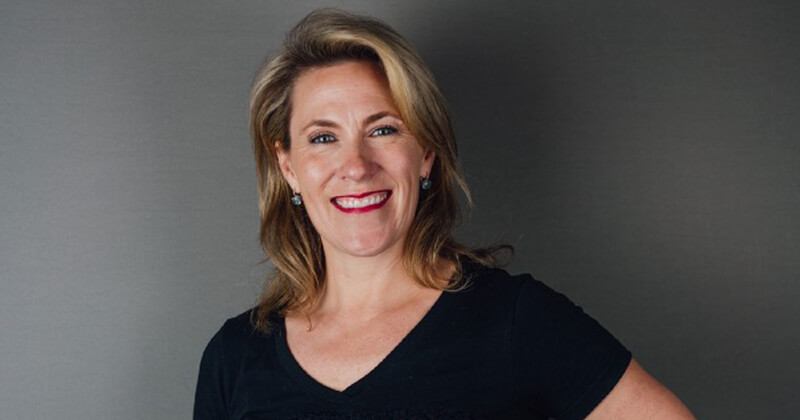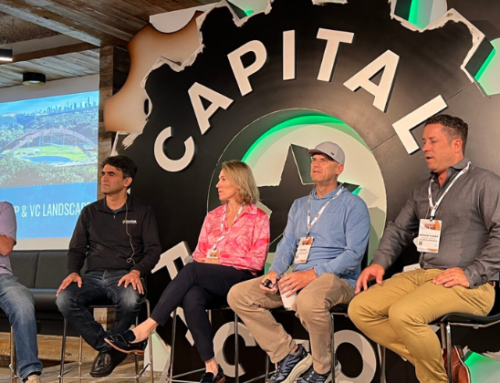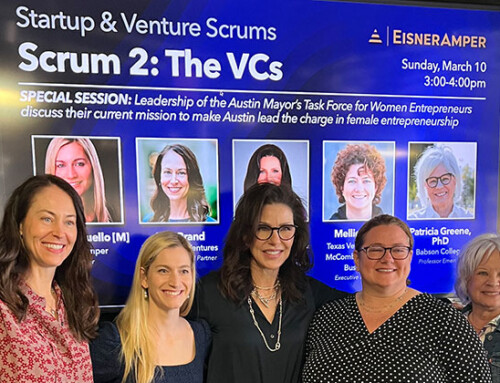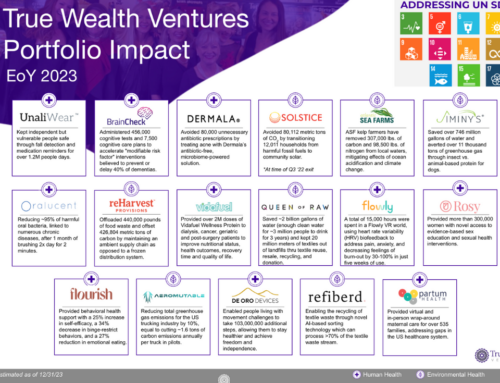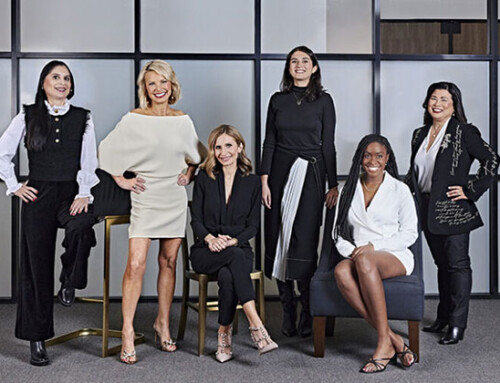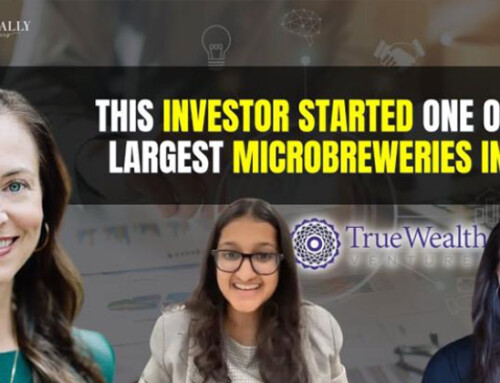Kerry Rupp Tells Why True Wealth Ventures Focuses on Female Founders
The Forrest Files: August 18, 2020
Hugh Forrest
Kerry Rupp is a General Partner at True Wealth Ventures, an early-stage venture capital fund investing in women-led businesses in the sustainable consumer and consumer health sectors.
She is also a nationally-certified instructor for the National Science Foundation’s Innovation Corps (I-Corps) program, helping university-based teams to commercialize their science and technology research.
Rupp is an active startup coach who is asked to judge at startup competitions nationwide and is a frequent speaker on entrepreneurship, innovation and early-stage investing. She serves as a mentor at Capital Factory, on the Advisory Panel of the Texas Health Catalyst program at Dell Medical School, and on the Steering Committee for Women@Austin, an organization focused on making Austin the best place to be a woman entrepreneur.
Previously, she was the CEO at DreamIt, a Top Ten US startup accelerator and early-stage venture fund, where she was directly involved with the launch of over 150 companies. During her five-year tenure with DreamIt, she grew its programs to five cities, raised a $20M follow-on fund, and initiated the DreamIt Access (minority entrepreneur), DreamIt Athena (female entrepreneur), and DreamIt Health programs.
When not working with startups, traveling is one of her main passions: “Sitting still and the concept of a ‘routine’ are anathema to me. In fact, I’ve been to all 50 states and 54 countries. So I’d like to get back on that circuit to keep opening my mind and challenging myself in new ways.”
What attributes does True Wealth look for before your fund will make a startup investment?
As with any VC investor, it’s ultimately about the financial return potential of the opportunity when the company exits — and we look at the same things you’ll hear from other VCs: the team, the market size, the defensibility of the company’s IP or approach, the scalability of the solution, etc… But as a certified impact fund, we also explicitly invest in companies where it is core to the company’s business that they’re improving human and/or environmental health (not just in that industry vertical, but literally showing improvement in outcomes over time). And the core to our fund thesis is that the leadership or founding team has at least one woman of significant decision-making authority in a full-time role.
As a true Seed-stage investor, we can invest pre-revenue / pre-product, though obviously prefer to see some traction on those elements. We do, however, require the science is proven (for companies where that’s relevant) so generally won’t invest before clinical trials are complete, except in cases where company can go to market directly to consumers without the trial data and related claims.
What is the typical size / scale of a True Wealth startup investment?
We generally like to lead Seed-stage priced equity rounds, writing first checks of $500–750K. We’ve reserved two-thirds of the fund’s investible capital to follow on in the companies, so we expect to stay invested in the Series A of most of our companies, and participate in a few Series B rounds (so perhaps $3M max in a company over time). Note, however, that we’re looking for capital-efficient companies that aren’t likely going to raise many large rounds of capital before they exit.
How do startups with female founders approach entrepreneurism in a different way than their male counterparts?
There are plenty of generalizations I could make based on my observations, but instead I’ll share something we’ve experienced (and is one basis for our fund’s investment thesis) that is also backed by several studies. Women tend to be more motivated by the social impact their businesses can have rather than by the monetary gain possible. But that doesn’t mean they aren’t good investment decisions as women-led companies also tend to outperform financially. It just means money isn’t the main driver behind the woman entrepreneur — and the fact that she’s inherently focused on the impact likely makes for a more genuine connection to the solution, which could also lead to outperformance. I’ll also note that when women come into increased wealth, multiple studies show they tend to re-invest that wealth back into their family’s and community’s food, health, education and welfare, which means successful women entrepreneurs can kickstart a whole cycle of positive impact.
The data shows that companies with diverse teams (be it gender, ethnicity, cultural background or life experience) outperform. The team members’ different points of view cause participants to face new ways of thinking, more thoroughly evaluate the perspectives, and often result in innovative solutions. And women leaders tend to be better at reading the social cues to evoke those diverse opinions and allow a constructive debate, often resulting in better outcomes. So we are stacking the deck with an inherent advantage by investing in women-led startups.
When you have pitched the concept of True Wealth to potential limited partners, what kind of reaction have you gotten?
Well, our pitch is very data-driven, based on reputable studies showing the financial outperformance of women-led companies and the opportunity created by the lack of VC funding going to those companies (still under 3%!). When we were first raising Fund I, this data wasn’t yet widespread, and so there were a lot of wide eyes as they learned something new. Most prospective investors leaned into this information (literally — body language changed) as a differentiator that could increase the likelihood of a higher return. But it was women investors who converted. 80% of the Limited Partners in Fund I were women decision-makers — a significant number self-made successful businesswomen in their own right.
I think for the women, the data just reinforced their own lived experience — being and working with effective women leaders — so it wasn’t a big leap to then write the check. I think for others, just hearing this data for the first time, they were still up the Awareness stage of the marketing funnel and they may be more educated on the topic, and more receptive by the time Fund II rolls around.
We did talk with two prospective investors who told us that we were really impressive and had the right background and experience to raise venture capital, but that — in their sage wisdom — we should really “just take the woman part out.” They didn’t seem to get that “women” weren’t “a part” — but the whole. Just as with products and services, a VC fund needs to identify its target market — and these guys were not ours!
Preston James is doing some pretty interesting stuff with DivInc. How does his mission align (or not) with what you are doing at True Wealth?
As early-stage VCs, we are very thankful for — even reliant on — programs like DivInc and related ecosystem players, who support companies through those early “chicken-or-the-egg” days where they need funding to grow, but need to grow to secure funding. The nature of our business model means we will only fund a handful of companies per year, and because we’re sitting on the boards of those companies when we’re not screening new companies, we don’t have the resources to also support the thousands of early-stage companies out there looking for advice and connections in those early days.
We do regularly drop in to support these various programs with mentoring office hours, judging pitch competitions, and/or speaking on panels (in fact, my business partners Sara Brand is a mentor specifically at DivInc) — but we can’t be in the trenches day-in and day-out with the entrepreneurs the way these programs are. We do, however, also look to these programs as a great source of potential future investments. We keep a “proactive deal sourcing” list — where we actively screen each incoming cohort, and request introductions to the entrepreneurs whose companies may eventually be an investment fit, in order to get to build a relationship and watch them grow over time. Unfortunately, we haven’t yet found a funding match with DivInc’s portfolio, but that’s not unusual with us having such a discrete investment focus. We’ll keep trying!
How has COVID impacted your day-to-day routine at True Wealth?
Not as much as we might have expected. Sure, we miss leaving the house, and pants, and hugs, and all the things all of us are missing. But we never had a physical office and did a lot virtually via phone and Zoom already. In some ways, deal sourcing is actually more efficient now, as we can “attend” more conference pitch events and 1:1 matchmaking sessions than we would have if we’d had to fly to them. We’ve invested in two new companies since COVID hit, doing all of our relationship-building with the founders and due diligence on the companies via Zoom. And we’re still networking and sharing deals with other VCs, and having company board meetings, all via Zoom, Slack, email, etc…
What is your favorite thing about Austin?
I really value the collaborative nature of the startup ecosystem here. When I came back to Austin from a few years running the DreamIt accelerator on the East coast, the community here was really receptive to incorporating our program into the fold. We even ran our first accelerator cycle in Capital Factory’s new-at-the-time co-working space. Eight years later, I think we all still subscribe to the rising tide lifting all boats concept for Austin entrepreneurs and investors, vs fighting one other for status or power or even deals. I still feel great collaboration between the accelerators, co-working spaces, angels, VCs and other programs supporting the sector and really value the relationships I’ve built and how we’re collectively supporting Austin’s growth.
Hugh Forrest serves as Chief Programming Officer at SXSW, the world’s most unique gathering of creative professionals. He also posts frequent interviews on Medium with innovators and thought-leaders from Austin, across the United States and around the world.
Link to Read: https://medium.com/@hugh_w_forrest/kerry-rupp-tells-why-true-wealth-ventures-focuses-on-female-founders-27e180e31646

